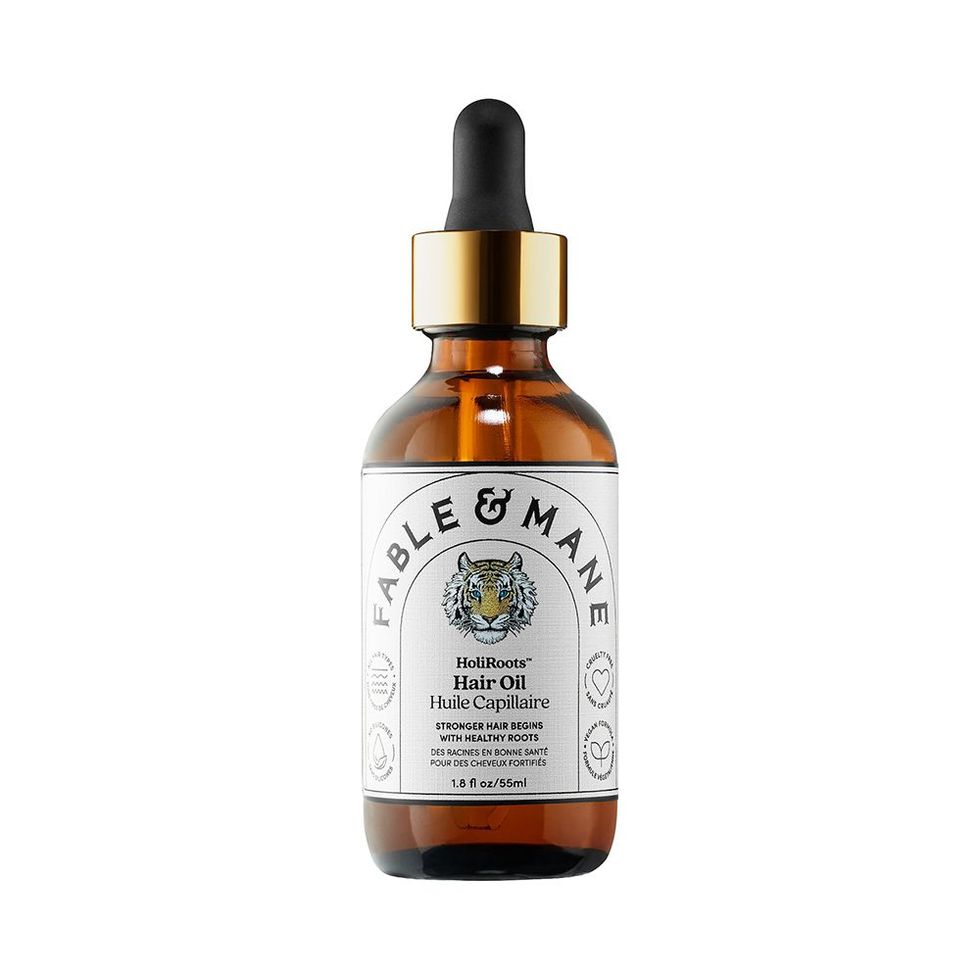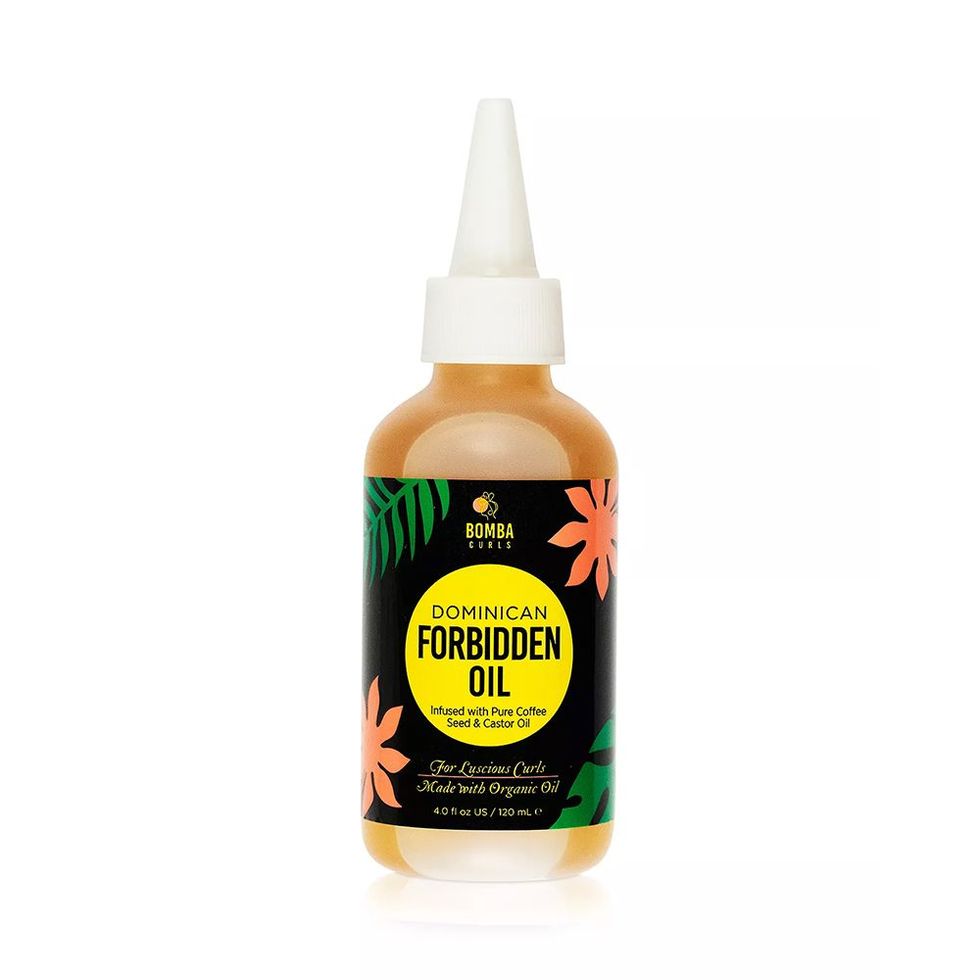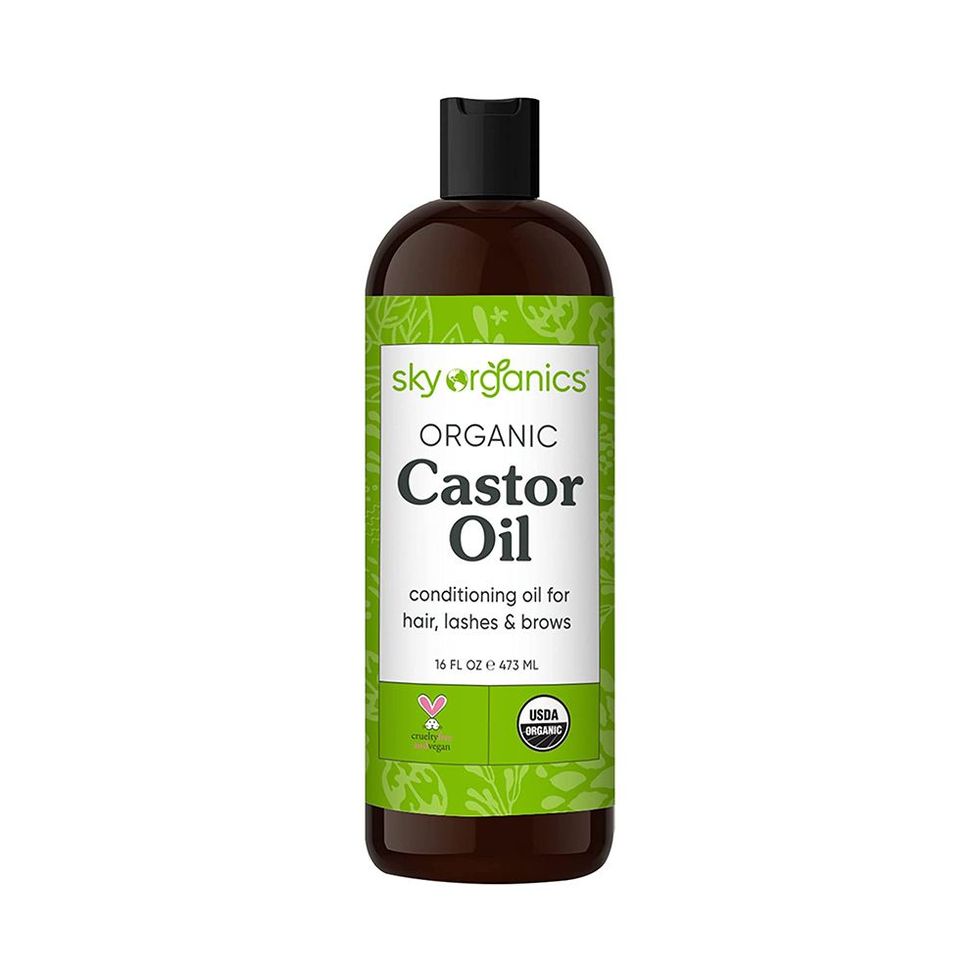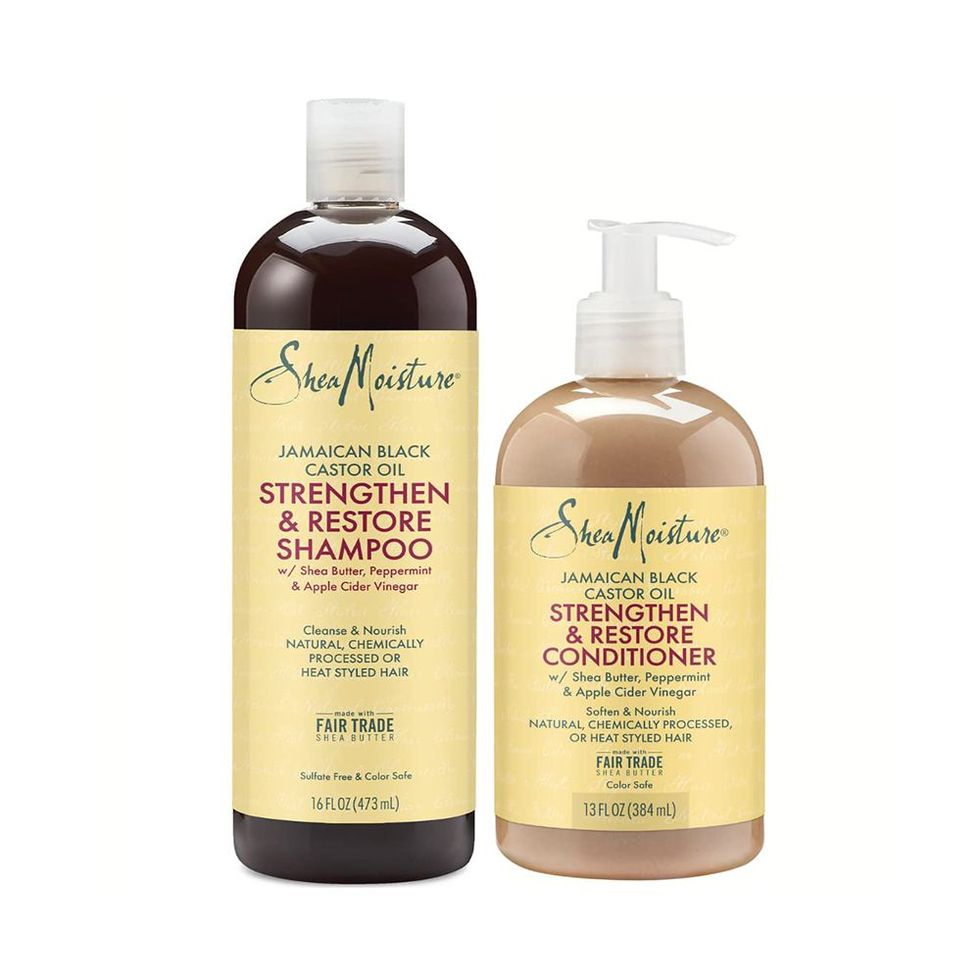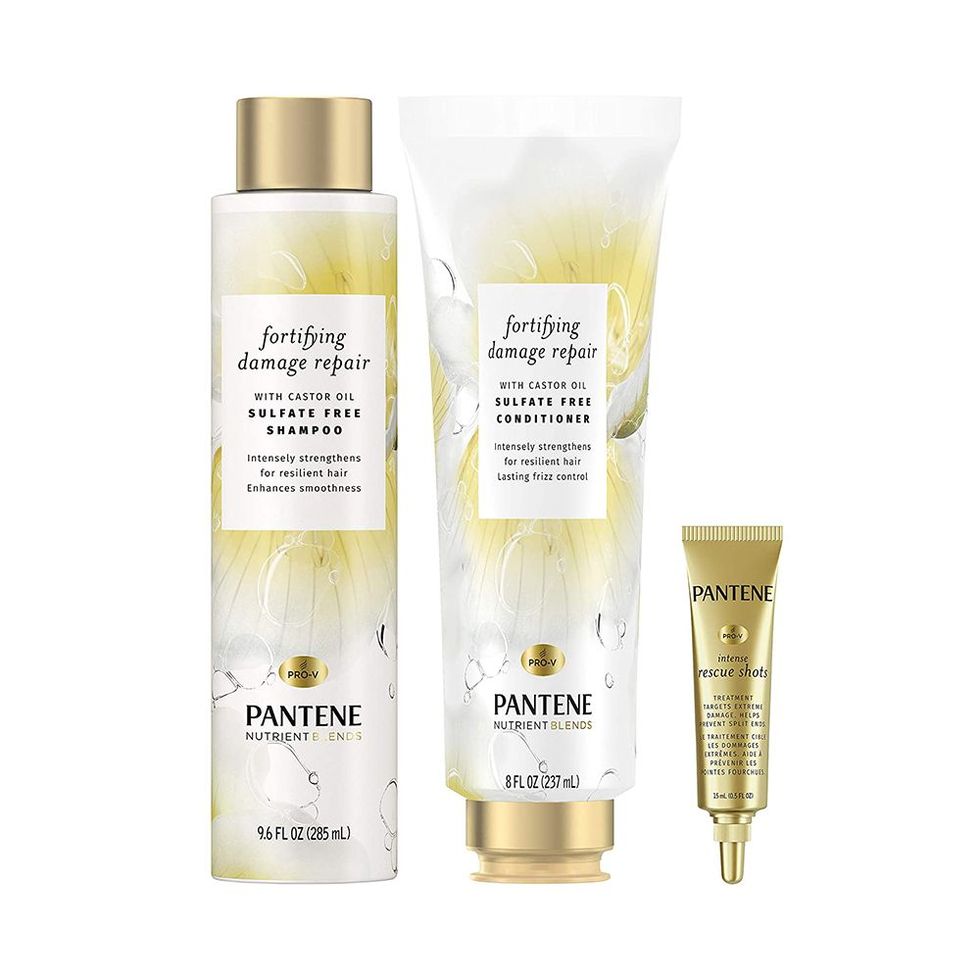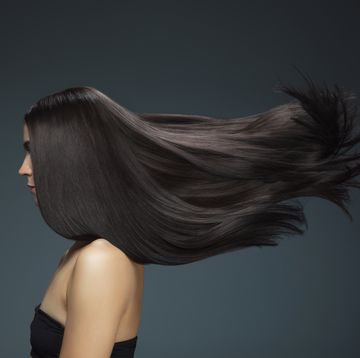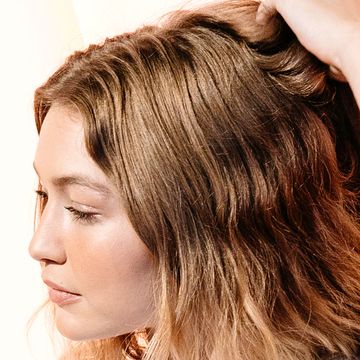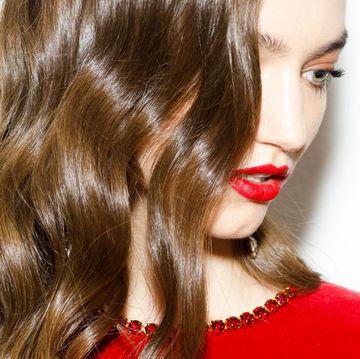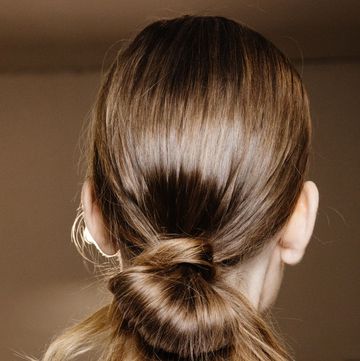Did you know that you don't have to have dry, unruly, dull hair? While there seem to be new hair growth oils, hot tools, and hair masks every week, sometimes you can't beat an OG beauty ingredient that's been used since, err, the beginning of time.
"Castor oil is the world’s oldest and most popular herbal remedy for hair oiling," says Nikita Mehta, co-founder & creative director of ayurvedic haircare brand Fable & Mane. "It's rich in fatty acids like ricinoleic acid, making it very viscous and therefore nourishing and moisturizing. It's proven to coat the shaft of the hair, reducing damage and helping it to grow longer and stronger."
With 566 million views dedicated to #castoroil on TikTok and over 258,000 posts on Instagram, users claim the oil does everything from making hair shinier and bouncier to growing it thicker and longer. But are these claims legit? We ask three experts about the benefits of castor oil and exactly how to use it.
More From ELLE

Meet the Experts
Dr. Nikki Hill is a board-certified dermatologist and hair restoration expert.
Bridgette Hill is a certified trichologist, colorist, and scalp therapist.
Nikita Mehta, co-founder & creative director of ayurvedic haircare brand Fable & Mane.
What is castor oil and what are its benefits?
Castor oil, also known as Ricinus communis, is a nutrient-rich vegetable oil from castor beans. Although it originates in tropical East Africa, it is widely used in India and the West Indies for cosmetic and medicinal purposes. Castor oil is usually clear or pale yellow unless derived through roasting or boiling, known as black castor oil.
Down to a molecular level, castor oil is a long-chained fatty acid. “Fatty acids provide essential proteins and nutrients to hair follicles and prevent hair follicle inflammation,” says Bridgette Hill.
Aside from being anti-inflammatory, castor oil has a few other noteworthy properties. “Some benefits of using castor oil include increased gloss or shine of the hair, increased hair shaft flexibility by coating the hair shaft, [and] providing antimicrobial properties,” says Dr. Hill.
Does castor oil stimulate hair growth?
“No studies exist showing castor oil can increase hair growth >1cm/month, which is the FDA standard of hair growth,” says Dr. Hill. “However, I have patients tell me differently all the time. Additionally, 90 percent of castor oil is made up of the fatty acid ricinoleic acid. [It] is known to stimulate the Prostaglandin E2 receptor, leading to blood vessel dilation. When applied to the scalp, increased blood vessel dilation increases the flow of oxygen-rich and nutrient-rich blood to the powerhouse of your follicle, the dermal papilla, or the root of the hair.”
Bridgette Hill agrees that castor oil indirectly promotes hair growth. “Because of the nutrients in castor oil, it protects the hair follicle from outside cellular and tissue invaders that destroy the health and vitality of the hair follicle.”
Is castor oil safe to use on the eyelashes and eyebrows?
The short answer: yes to the eyebrows, but be cautious with the eyelashes. “If there isn’t an allergy to castor oil after patch testing, it is safe to use on the eyebrows,” says Dr. Hill. “There is no safety data about castor oil and eye health, so I would be cautious and speak with an ophthalmologist about applying castor oil in close proximity to the eye.”
How should castor oil be applied to your hair and scalp?
Although castor oil is widely used, it is not meant for everyone. Therefore, the importance of a patch test comes into play again before applying it to your scalp. “Apply a small amount behind the ear or the inner upper arm for a week,” says Dr. Hill.
Once you determine that castor oil is compatible with your scalp, the next step is figuring out the right amount. "Hair oiling can work for all hair and scalp types, but the secret to how much [ingredients] lies in the formula," says Mehta. Her rule of thumb: the purer the oil, the heavier it'll be. Here, Dr. Hill also goes into more detail:
- Fine to medium straight hair: Castor oil can be used as a deep treatment to protect the very ends of your hair fiber, the last two to three inches of hair. Use it as a pre-shampoo treatment to help keep the tangles away. Be sure not to overuse; shampoo your hair thoroughly and style it as desired.
- Medium to thick straight/wavy hair: Apply throughout the entire head for an intense pre-shampoo treatment. Add heat or steam for deeper penetration into the hair cuticle.
- Wavy to loose curls: I suggest mixing drops of castor oil into conditioners during these hot and humid summer months.
- Curly to tightly coiled: I suggest using castor oil as needed throughout your regimen, [as a] pre-shampoo, added treatment, or as a weekly moisturizer. It is essential to perform a proper monthly detox shampoo when using heavy oils like castor oil.
What's the best way to use castor oil?
The best way to use castor oil is on dry hair and scalp. "Warm the oil between your palms first, then work it through the roots and massage onto the scalp, focusing on the crown chakra (the top of your head) to relieve tension and feelings of stress," Mehta says. After combing the excess through to the lengths of your hair, let it sit in for 20 minutes or even overnight. "Rinse it thoroughly with lukewarm water and then shampoo out. You may need to double cleanse to make sure you remove all traces of the oil, and I usually skip the conditioner after hair oiling as the oils provide so much hydration. You’ll notice a difference in hair hydration and, if done consistently, you’ll see hair growth in length and volume."
What is the best type of castor oil to use?
All of our hair experts recommend cold-pressed castor oil.
“Cold-pressed castor oil can be used on the hair shaft," Dr. Hill says. Mehta describes it as pale gold in appearance, adding that since "castor oil is so thick and can ‘stick’ to hair, it’s best used when diluted with a lighter carrier oil, such as coconut or almond."
If you're interested in trying black castor oil, Dr. Hill notes: "It should be applied only to the scalp. If black castor oil is applied to the hair, a cuticle-sealing technique should be used afterward. Both forms will provide sufficient components of ricinoleic acid.”
When should you avoid castor oil?
It is best to avoid using castor oil on your hair if you’re suffering from dandruff. Both of our experts say it can make the condition worse.
As ELLE’s beauty editor, Margaux wants to try it all and do it all…and she does. She's not afraid to chop, slather, dye, swipe, inject, and more—and if it's worth your time and money, she’ll rave about it here.

